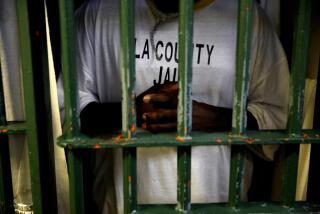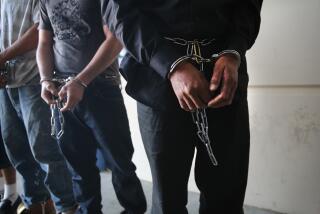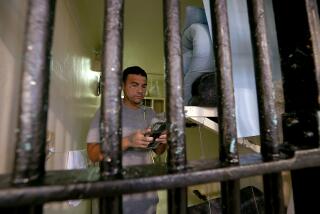Cel Phones Often Seized as Cell Phones
- Share via
Small and easy to conceal, the cellular telephone is fast becoming hot new contraband in America’s lockups, adding to the custody woes compounded by crowding, violence and longer sentences, according to penal experts.
“The contraband is really changing along with the gadgets of our times, especially the cellular phone,” said Jess Maghan of the Center for Research in Law and Justice at the University of Illinois-Chicago.
During a massive search last year of one Pennsylvania prison, Maghan said, cellular telephones were “the biggest item of a contraband and the most surprising find.”
Federal authorities alleged Tuesday that former professional football player Darryl Henley used a cellular telephone smuggled into the Metropolitan Detention Center to engineer a cross-country drug deal. Prosecutors said a jail guard provided the phone.
It was the second time since March that a guard at the Los Angeles center has been charged with aiding an inmate by smuggling a cellular phone into the center. In that case, the officer, a 10-year corrections veteran, pleaded guilty to charges related to supplying a cellular phone, a fax machine, a small computer, electrical cords and drugs to a prisoner awaiting sentencing for a $1.5-million tax evasion scheme.
On Tuesday, Rodney Anderson, an officer at the center, was charged with conspiring to distribute heroin with Henley and another man.
Prosecutors allege that Henley, using a cellular phone that Anderson provided, received a call at the center from an undercover drug agent.
When the agent called back 30 minutes later, authorities said, Henley answered and said he was working with Anderson.
A call Tuesday to the cellular telephone number listed in the criminal complaint was greeted with, “Hello, welcome to LA Cellular voice mail,” and a message that the number is no longer valid.
Guards sneaking contraband to inmates is not a problem unique to the Federal Bureau of Prisons, the agency that oversees the Metropolitan Detention Center, say prison officials and penal experts.
Dozens of prison and jail officials have been charged in recent years with bringing prisoners unauthorized items usually in exchange for bribes. Many cases involve drugs, a ubiquitous form of currency in most prisons, where the possession of paper money is prohibited.
If cellular telephones become readily available in prisons, officials and experts said, it could compromise security. Corrections officials routinely monitor calls made from pay phones.
“Inmates have always learned to use phones for a lot of extortion and other schemes,” Maghan said. “With cellular phones they can just bypass the security system and do their business.”
It is not known how widespread the problem is. California corrections officials did not return repeated calls for comment Tuesday.
Bill Bechtold, spokesman for the Federal Bureau of Prisons, said the agency does not keep statistics on contraband searches and doesn’t know how many cellular phones have been confiscated from prisoners.
Bechtold said the agency also does not require federal guards to be searched unless officials suspect they are bringing unauthorized items into a lockup.
Last October, a federal inmate and a corrections officer in Colorado were charged with swindling a Japanese brokerage in New York out of thousands of dollars in an intricate scheme conducted from prison with a cellular phone.
The officer was charged with giving the phone to an inmate in July 1993, along with the names and telephone numbers of brokerage firms.
Authorities alleged that the inmate opened a brokerage account using a phony name and claiming to run a company worth $7 million. He then placed orders to buy securities, federal officials charged.
A week later, the prisoner allegedly instructed the broker to wire $40,000 to the officer, $25,000 to his fiancee and nearly $30,000 to a Lexus dealer.
Contraband smuggling by prison guards “is a serious problem,” said Alvin Bronstein, former director of the National Prison Project for the American Civil Liberties Union, now a consultant and lecturer on penal matters.
One reason, Bronstein said, is that “very often you have a lot of the line officers who know the prisoners. So you have cousins guarding cousins.”
In states where pay is low, prisons are crowded and danger is high, Bronstein added, “there is a great deal of temptation.”
More to Read
Sign up for Essential California
The most important California stories and recommendations in your inbox every morning.
You may occasionally receive promotional content from the Los Angeles Times.










